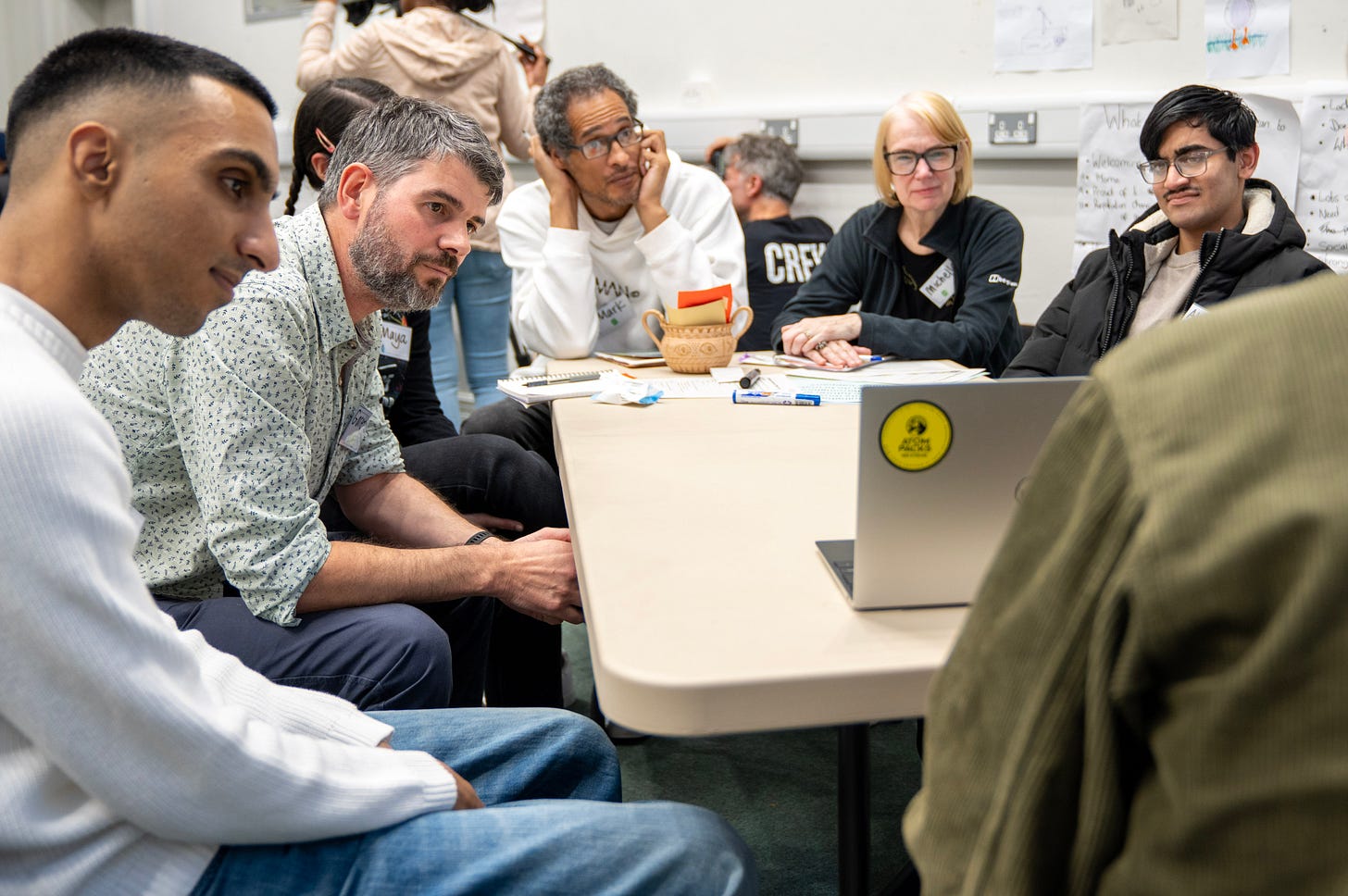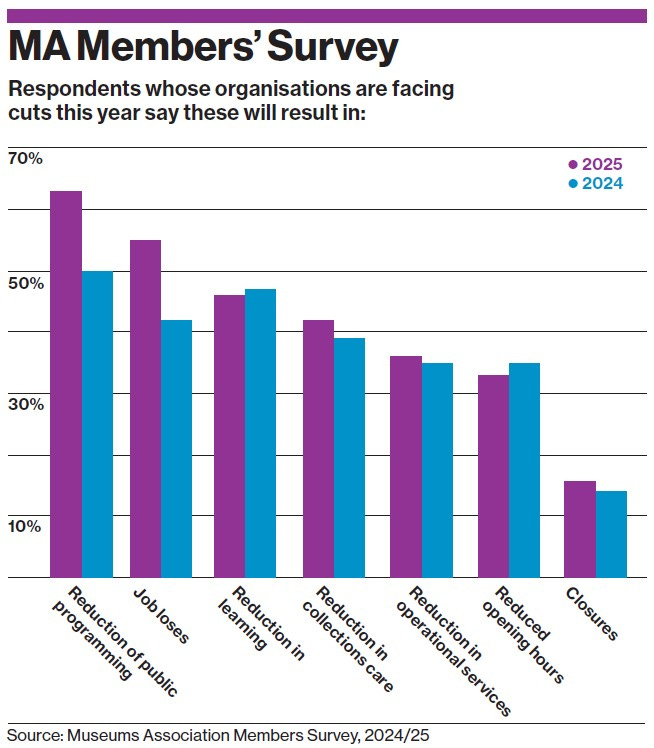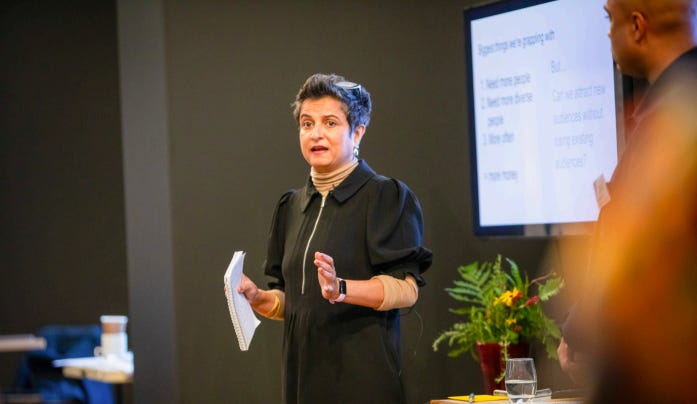Birmingham speaks, museums listen
In one of our occasional long reads, DemNext’s Chief Strategy & Creative Officer Lucy Reid talks about some of her favourite intersections - culture, citizens, civic spaces, and museums.
“The voice of the museum is to some extent, the voice of the people, and we want everyone to hear us a mile coming.” - from the statement written by the Birmingham Museums’ Citizens Jury.
Two things I care about a great deal have been in the news a lot of late: Birmingham. And museums.
With the relentless and often disorienting stream of headlines from the US, it can be hard to know where to focus, especially as the Trump administration continues its broad attacks on institutions, including museums and libraries - through defunding, audits, political takeovers, and executive orders directing the removal of ‘improper, divisive or anti-American ideology’.
As Adrian Horton noted in The Guardian, attempts to control the arts are a hallmark of oppressive regimes, which is unsurprising given the arts’ frequent role in advancing social justice. This is a dynamic familiar in the UK’s own culture wars, which, though declared “over” continue to echo in public discourse and policy. So we’re accustomed with the broad remit of these narratives, which cover everything from outrage over the sharing of facts about the legacies of colonialism, to shock in certain press outlets at the National Trust’s ‘secretly woke’ vegan scones*. Many cultural organisations here will be keeping an eye out for the inevitable ripple effects from what’s happening in the US.
*Spoiler alert - they have been vegan for years, as the recipe uses margarine, which is vegan.
What is the antithesis of the populist takeover? We know that the authoritarian playbook taps into people’s often legitimate frustrations with the status quo and with institutions (read more about this in International Advisory Council member Ece Temelkuran’s seminal book How to Lose a Country).
To this end, the question of ‘who decides’ is key. When it comes to museums, who decides whose stories should be told, and by whom?
Over the last year, I’ve had the privilege of advising and acting as a critical friend to Birmingham Museums Trust (BMT) Co-CEOs Sara Wajid and Zak Mensah, and the museums’ leadership team, on their citizens’ jury - a first for a UK museum - working alongside the brilliant team from Shared Future, who facilitated the jury.
This (literally) couldn’t be closer to home for me; these are the museums I take my kids to. It’s also personal because many things are being ‘done to’ Birmingham at the moment.
Having ridden the exhilarating wave of the 2022 Commonwealth Games, Birmingham’s fortunes have not lived up to this joyous moment of late. The city has faced national scrutiny since the council declared bankruptcy, prompting national government intervention. Arts and heritage funding is being cut, key civic buildings are under threat, and the ongoing bin strike is making national headlines.
In short, Birmingham needs more reasons for hopefulness and joy, and museums need to find ways to continue being relevant and needed - not just here, but around the world. Here’s where the first citizens’ jury in a UK museum comes in.
The power of Birmingham in a room
You can read the details of the process, and the recommendations made by the citizens in Shared Future’s report. What’s harder to convey is the jury’s impact on those who took part, and on those who observed. This lovely film by the brilliant River Rea Films gives some good insights.
One of the most electric moments is the first time the citizens meet after months of planning. Twenty-eight people from across the city. Aged 18-79. From all backgrounds and all walks of life. The room looked, felt, and sounded like Birmingham. Most were aware of Birmingham Museum & Art Gallery (one of the nine sites operated by BMT) as a physical presence in the city centre, but either had never visited, or not been since they were kids.
That BMT decided to have a citizens’ assembly in the first place is down to Mark O’Neill, independent museums consultant, writer, and former Head of Glasgow Museums, who is an advisor to BMT, and first suggested a jury to Zak and Sara as a different way of making plans for the future. Mark was familiar with the outcomes of the German museums’ citizens’ assemblies, which DemNext had also advised.
Power shifts?
Participation, co-creation, and co-curation are all methods that are well used in museums, and to which BMT is no stranger - with plenty of great work under their organisational belt. However, one of Mark’s many pearls of wisdom that struck a chord with me is that whilst most museums do consult or co-curate, this is usually with one specific audience, rather than with a group that is representative of the local population.
So, while existing well-developed participatory practices can lead to great work and strong relationships, this is often temporary. What this work rarely does is shift power - at least not sustainably. When it comes down to ‘who decides’, the answer is still usually ‘we, the museum, do’. The discussion about the power dynamic, and what will happen to citizens’ recommendations therefore needs to be honest, and happen up front. Will the museum commit to acting on the recommendations? Will they cherry pick the ones they like? What does follow up look like?
Citizens’ assemblies are not just a better form of one-off consultation; this is about shifting decision-making power over a sustained period of time.
Questions and trade-offs
Citizens’ assemblies work best when responding to difficult trade-offs. The jury has taken place at a critical time for the city’s museums. The financial pressure on local authorities, lack of long term funding, the impacts of Covid, and the spiralling costs of running and maintaining nine historic sites means that Birmingham’s museums are in real peril.
Although visitor numbers have gradually increased since the doors re-opened post lockdown, this is not to a level needed to ensure long term sustainability. Furthermore, visitor profiles do not reflect the city’s demographics; those with a degree or professional qualification are up to 4.6 times more likely to visit a museum than those with no formal qualifications. This means that museums are failing to meet the needs of the majority of the population.
So what does this all mean for how Sara and Zak should prioritise resources? Would citizens understand the trade-offs? The question set for the jurors was therefore:
What does Birmingham need and want from its museums now, and in the future? And what should Birmingham Museums Trust do to make these things happen?
Over the course of 30 hours, the jury met in person and online. Their time listening and deliberating culminated in the 11 ‘Roles of the Museum’, and 20 recommendations, covering four key themes: funding and marketing; community engagement and collaboration; exploring diverse perspectives; new audiences, accessibility, and inclusivity.
“Thank you for showing me Birmingham Museums are not boring.” - Jury member
Learning to citizen
On 30 January 2025, at a special event at Thinktank, Birmingham’s Science Museum, the citizens’ jury’s recommendations were unveiled to a group of local and national stakeholders.
David Jubb, from the Citizens’ In Power Network wrote a blog post about attending the launch event, which was led entirely by the jury:
“The room felt different. Not the usual museum-sector gathering, where the audience nods along to a vision set by senior leaders… This was something else. This was a museum led by its citizens… And yet, most began this journey not seeing themselves as museum people… They left as advocates, co-owners, and champions of a cultural space that they had helped to reimagine.”
As an observer of the whole process, the most powerful moment was watching the impact of the citizens’ work on those present, on the museums’ staff, and on the citizens themselves.
Citizens spoke of feeling ‘more involved’, becoming ‘an active citizen through this process’, and learning ‘to take on board people’s opinions and listen to people, and it’s made a huge difference to me!’.
Staff were visibly moved by what the citizens said, and by seeing a group of people who arrived as strangers - to each other, and to the inner workings of the museums - leave as passionate and knowledgeable advocates for their museums. It has undoubtedly been a huge boost at a very difficult time for civic museums in the UK.
What happens next?
Throughout 2025, BMT will continue to meet regularly with the jury to formally update them on progress, and explore other opportunities for the jury to remain involved. We’ll report more on this later in the year. There has been a little light on the horizon for English civic museums, with the government’s announcement in February of a £20m Museum Renewal Fund. Let’s hope that the work of the citizens’ jury will propel BMT to the front of the queue.
Final thoughts
The last word must go to the citizens who took part. This is their collective statement:
“At the beginning of this process we didn’t know what to expect. Many of us haven’t been to a museum in a long time, we didn't know what Birmingham Museums Trust was about, and what it could mean to us. We were not engaged and did not feel close to our museums.
As a result of the process, we feel more pride in our museums and the city. We heard a range of perspectives speaking on diverse topics that relate to how the industry works. As a group of different people with different lives we have different opinions, but have found consensus in our shared aspirations for Birmingham Museums Trust to thrive. We feel more connected to our museums and hopeful for their future. We have enjoyed being a part of this decision-making process and it has made us advocate for and promote our museums in our own communities.
Our museums need to update how they are perceived in Birmingham and on a national stage. The re-opened Birmingham Museum & Art Gallery is much more appealing, we hope to see this continued across the other sites, and that the Trust makes sure the people are aware of the amazing things it has to offer and the process it has gone through.
We acknowledge our museums are fighting for their survival; they must take risks in their bid to be inspiring, educating, engaging to all. It is important for our museums to involve and represent the communities they are responsible to, i.e. the people of Birmingham and they shouldn’t be precious about doing so. We deserve museums that are proud of us, that we can be proud of, that celebrate what’s unique about Birmingham.
The voice of the museum is to some extent, the voice of the people, and we want everyone to hear us a mile coming.”
📡 Watch, read & listen
Research article published by the Journal of Deliberative Democracy: ‘Mini-Publics and Party Ideology: Who Commissioned the Deliberative Wave in Europe?’, authored by Rodrigo Ramis-Moyano, Graham Smith, Ernesto Ganuza and Thamy Pogrebinschi.
Roger Berkowitz, Director of the Hannah Arendt Centre at Bard College, has published ‘Temptations of Tyranny’, citing DemNext CEO Claudia Chwalisz’s essay on the Paris citizens’ assembly.
DemNext’s International Advisory Council Member Hugh Pope has published a piece discussing the UK podcast The Rest is Politics, and how ‘Citizens' assemblies are inching into the mainstream’.
DemNext is proud to be an expert member of The Citizens In Power Network (referenced above), which is designed to reimagine decision-making in the UK’s cultural and creative sectors and beyond. You can sign up for updates here.
🐝 Upcoming events
May 15th, London
Lucy Reid, DemNext’s Chief Strategy & Creative Officer, will be speaking at the Museums and Heritage Show alongside Rob Lewis, Director of Transformation. They will present Citizen power: from the irrelevance of, to pride in, museums, in relation to the above involvement with Birmingham Museums Trust’s 2024 citizens’ jury.











Wonderful - let me know if I can support any future Citizens' Juries / Assemblies in Birmingham. I was founder of the Oxford Citizens Assembly Network (OxCAN) in 2019 which supported the City Council in announcing and running the first proper CA on climate change run by a UK LA.